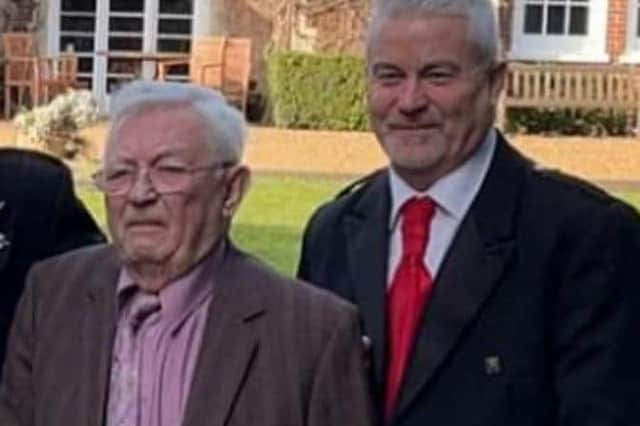EMAS 'deeply sorry' after heart patient's 'one hour 45-minute' wait for ambulance in Skegness


John Cockrane had popped into a cafe in Skegness with his son, Jock, for breakfast before driving back to Scotland following a family wedding in Norfolk.
He had been ill at the wedding and his condition worsened when he returned to Skegness to stay with family, resulting in him being admitted to Pilgrim Hospital in Boston for treatment.
Advertisement
Hide AdAdvertisement
Hide AdHowever, after being discharged and before setting off home, he suffered a further heart attack and his son, Jock, alerted the emergency services.


It was one hour 45 minutes later that the paramedics arrived at Lite Bites on Roman Bank, Jock told Lincolnshire World.
While John lay on the floor of the cafe, his son frantically called the emergency services to find out where the ambulance was.
"I was told my father was a priority but it might take six hours for the ambulance to come," said Jock. "I even tried the police at one point because I didn't want to drive him myself and something happen on the way and not know what to do.
Advertisement
Hide AdAdvertisement
Hide Ad"I lived in Skegness for over 10 years and worked at Butlin's but when we called for an ambulance it never took that long.
"Response times have certainly got worse since I lived here. I hate to think what would have happened if my dad had had his heart attack in the middle of nowhere."
While his father was back being treated at Pilgrim Hospital, Jock went along to Wednesday night's Skegness Town Council meeting where MP for Boston and Skegness was present for public questions.
Mr Cockrane spoke to the MP about his father and asked what was being done to improve services.
Advertisement
Hide AdAdvertisement
Hide AdMr Warman said he was aware East Midlands Emergency Service had been under great pressure post-Covid.
"Things had improved just before Christmas but I am aware of the recent problems," he said. "This is largely due to problems connected with the discharge of patients.
"What I can say is the Government is investing £55 million in the A & E department at Pilgrim Hospital and the Prime Minister Boris Johnson came to Boston to announce this.
"There are no overnight solutions to the problems I'm afraid, but I do get it."
Advertisement
Hide AdAdvertisement
Hide AdSue Cousland, Divisional Director for Lincolnshire at East Midlands Ambulance Service (EMAS) said: “We are deeply sorry that we were not able to arrive sooner, and we recognise the distress that this will have caused the patient and those trying to assist at the time.
“Unfortunately, we are currently experiencing immense, sustained pressure on our service and our staff are continuing to work hard to prioritise the sickest and most severely injured patients.
“In addition, we continue to work closely with all our health and social care colleagues across Lincolnshire in response to the on-going high levels of demand being experienced across the wider NHS system.
“We urge the public to play their part by calling 999 if life is at threat, and to use alternative services such as 111 online, GP, or urgent treatment centres for other concerns. This allows us to respond to patients who need our ambulances with highly-skilled clinicians and life-saving equipment on board.
Advertisement
Hide AdAdvertisement
Hide Ad“We have asked to speak with the patient and their family, so we can fully investigate the delay experienced and respond to them in full.”
Mr Cochrane was discharged from hospital on Monday and he and his son spent a night at a hotel in Skegness before heading back to Scotland.
"We wanted to pop back into Lite Bites to thank the owner, Barry Robinson, and the customers who were there when my dad took ill for their support and help," said Jock. "We can't thank them enough."
EMAS FACTFILE
1. At the latest Trust Board meeting held in public on Tuesday, April 5, it was reported that during March 2022, EMAS responded to:
Advertisement
Hide AdAdvertisement
Hide Ad· 25,000 more calls during the month, compared to March 2021. The significant increase in activity is replicated across the other English ambulance services, some of whom EMAS has been supporting over the past week with 999 call handling.
· 14% increase in incidents - when someone has contacted 999 or 111, and we deal with the concern without needing to send an ambulance resource eg we offer hear and treat service, or no send/referral to a more appropriate service – when compared to March 2021.
· 50% of our responses resulted in a patient being taken to a busy hospital emergency department.
· 17,000 ambulance resource hours were lost due to ambulance crews and their patients being kept waiting due to delays in hospital staff being able to accept a clinical handover for the patient any sooner.
Advertisement
Hide AdAdvertisement
Hide AdA spokesperson told Lincolnshire World delays at hospital impact on the ambulance services ability to get to patients waiting for a 999 response in the community, often without the presence of a clinical professional on scene.
Handover delays are not an ambulance and hospital only issue and concern; they are a symptom of wider pressures across the NHS and social care systems, and both are working together to address staffing pressures and wellbeing whilst identifying ways of improving patient flow to reduce the negative impact on patient safety and wellbeing.
The spokesperson added: "We are grateful to partners and volunteers who continue to support us and offer their services during this sustained pressured time, and to the public who use their NHS wisely."